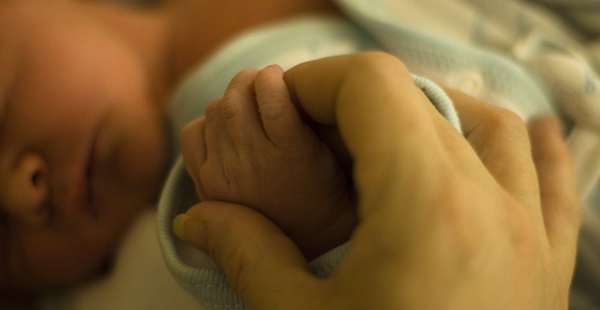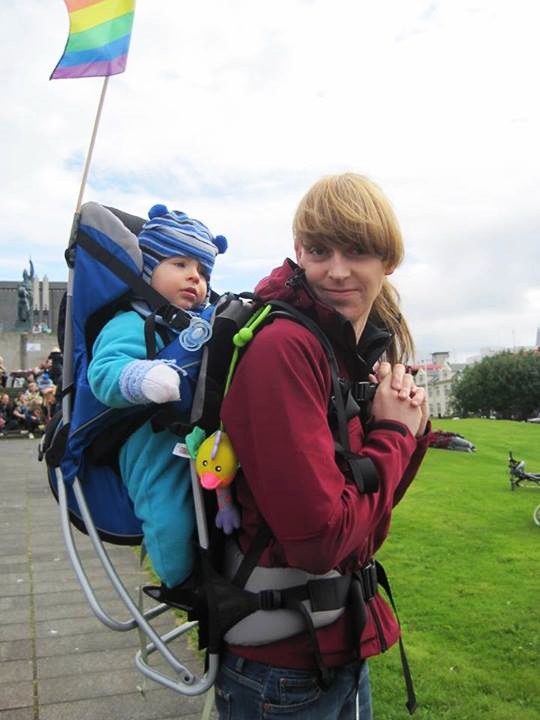“If the National registry says I‘m a woman, what comes out of a little refrigerator in a medical clinic isn‘t going to change that.”
Early on a cold October morning, two women rush to the hospital. One of them is in labor. A few hours later their son is born. As with any couple, the new mothers gaze at him in awe, and a few moments later they begin asking the age-old question: Who does he look like?
You see, for me and my fiancée, this bit is a little different from most other same-sex couples, owing to the simple fact that I‘m a trans-woman. And with the addition of our son to the family, you might call me a trans-parent (cue courtesy giggle).
By the magic of modern medicine (well, mostly refrigerating) we were able to have a baby without a third-party donation. For us, this wasn‘t essential, but since the possibility was there, it seemed pointless to dismiss it.
This whole arrangement has raised some eyebrows around us. Some of Helen‘s (my fiancées‘) less-familiar co-workers didn‘t quite understand why our son was said to „take after Elín in his looks“ when they visited her workplace a few weeks after his birth.
And when a woman I work with heard about the pregnancy she said: „Congratulations, I just heard you‘re going to be a … errr … parent.“
To a point, I understand her confusion. My biological and social roles in parenting don‘t match. But if you ever face a similar dilemma, avoid the pronoun-potholes of „past lives“. If the National registry says I‘m a woman, what comes out of a little refrigerator in a medical clinic isn‘t going to change that.
Seeing, however, that my path to motherhood is a bit different from most‘s, I realize that one day the time will be right to tell my son about that journey. Just the basics at first, so that he won‘t be caught by surprise if anyone mentions it. But by the time he begins to shave, he really shouldn‘t have to wonder why one of his mums is such an awesome teacher in that.
After going through the gender reassignment process, many trans-people feel the need to abandon their old identity completely, and deny it ever existed. This is called „going stealth“. In a small country, like Iceland, this might not be a perfect strategy. You‘re so bound to run into someone who recognizes you, you might just as well plan to.
Going stealth was therefore not an option, but at the same time I don’t feel any need to have pictures of me taken for a magazine, with the word “trans” written in bold letters across my forehead. I guess I‘m what you would call „semi-passable“ (not everyone figures out right away I‘m trans), so after meeting new people, sometimes they dive right in with questions, and I gladly answer.
So why should I hide this aspect of my life from my son? If we succeed in raising him to be able to look past the ways other people differ from himself, surely he won‘t have a problem with his mums being a bit of an odd couple? I guess the biggest concern is that he might say something in kindergarten, with his limited understanding of the situation, and other kids would deliver their own limited versions at home and that would cause some unfortunate misunderstanding.
But then again, I guess you could say that about every parent. Famous is the story about the little girl who drew a picture in class, of her mum seemingly dancing on a stripper pole, being handed cash from every direction. The mother had to explain to the teacher that the picture was illustrating her selling shovels at Home Depot, with customers lining up because of the incoming blizzard.
As any queer parent will tell you, bringing a child into such a family is no accident. It is a carefully planned decision. Probably much more thought out than with most straight parents. So the committment is there, long before the child is born. I‘ve always felt that this, combined with the experience of having to fend off the world, might give queer parents a good head start in parenting, should they choose to use it wisely.
But in the end, like every other parent, all we can do is to be the best mothers we can be. Provide to our son‘s basic needs, as well as those not-so-basic, listen to him, talk to him, hug him, see him stand on his own two feet, teach him about right and wrong, about the world, the good in people and the dangers best to steer clear off.
We´ll always be proud of him, regardless of how much he’ll take after us when he grows up, in his looks, hobbies, professions or otherwise.
And after all, isn’t that really what parenting is all about, and not the ratio between mums and dads?
– By Elín Esther Magnúsdóttir




